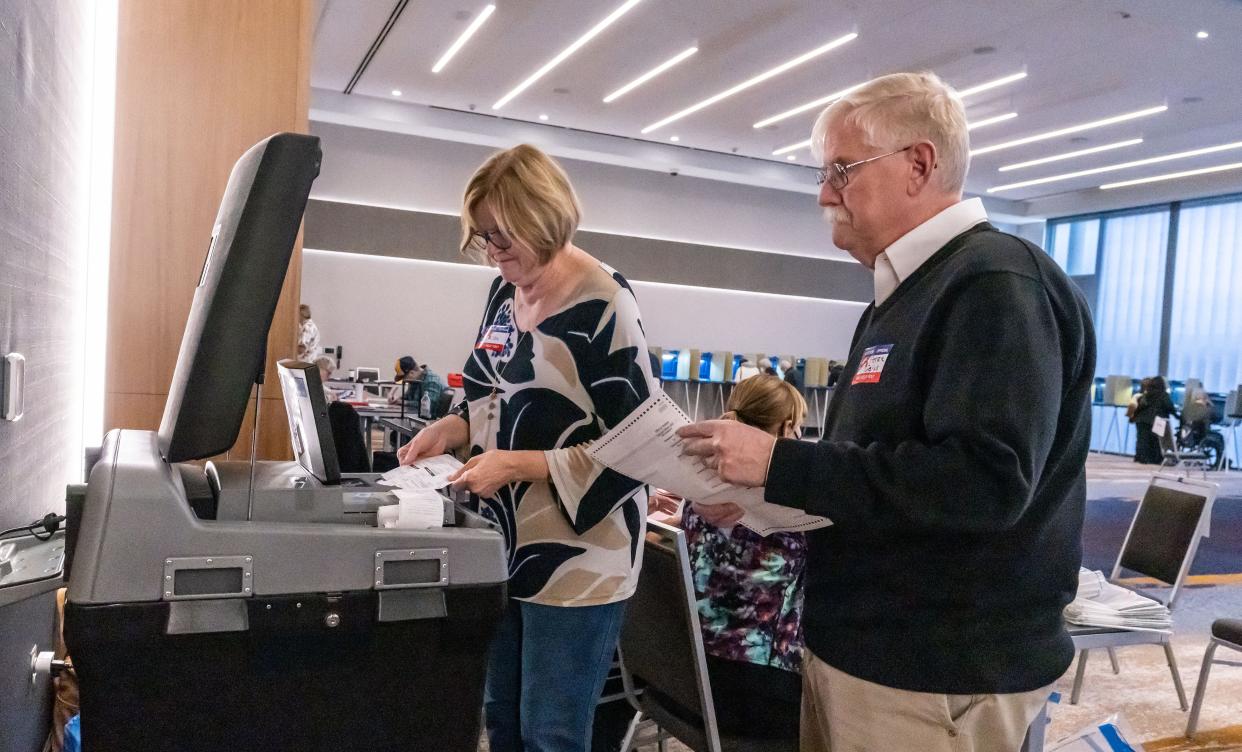What election observers can and can't do at Wisconsin voting sites

With Wisconsin considered a critical swing state in next month's presidential election, the eyes of the nation are expected to be on not just the results but the voting process itself.
That includes at the polls and at central count locations, where some municipalities count their absentee ballots.
The rules differ across states regarding who can watch the polls and what they are allowed to do.
Here's what to know in Wisconsin, whether you're interested in watching the voting take place or a voter wanting to ensure your right to vote is preserved.
Who can observe elections in Wisconsin?
Anyone except candidates up for election can be "election observers," according to Wisconsin Elections Commission guidance.
In Wisconsin, poll watchers are called "election observers" — and anyone can do it, regardless of whether they are observing on behalf of a political party.
Observers do not need to be Wisconsin residents. They also don't have to be U.S. citizens or live in the U.S.
One caveat: Only observers appointed by the two major political parties can be present during absentee voting in residential care facilities or nursing homes. They must follow the directives of the special voting deputies.
What are poll watchers allowed to observe?
Ahead of an election, observers can go to locations offering early voting.
On Election Day, they can go to polling locations and central counts, where absentee ballots are counted in 37 municipalities in Wisconsin, including Milwaukee.
They are also allowed at a recount, if one follows an election. In this case, candidates and their counsel may also be observers, according to the Wisconsin Elections Commission.
What do people need to do to observe elections?
Observers can arrive as soon as the polls open at 7 a.m.
Those looking to observe need to bring photo identification and check in with the chief election inspector, the person in charge of the voting site.
They will also have to sign in and wear an election observer badge.
Observers will then be shown where to sit and will be required to stay in that area.
How many people are allowed to observe an election at polling places and the central count location?
There are no set limits, but each chief inspector has the right to limit observers if the number begins to interfere with voting or cause too much congestion.
How far away can election observers stand?
Under current law, observation areas must be between three feet and eight feet away from the tables where voters announce their name and address or register to vote.
A Republican-led bill last year attempted to reduce the distance to no more than three feet away from the tables. Democratic Gov. Tony Evers vetoed that bill, saying it would increase the potential for observers to interfere with or intimidate voters and election officials.
Can observers use their phones?
Observers are allowed to text or silently use their phones in polling places, but they cannot take videos or photos while the polls are open. Making or taking phone calls in the polling area is also prohibited.
Members of the media may take videos and photos if doing so doesn't disrupt voting or reveal how someone voted.
Observers can take photos and video at central count locations as long as they don't disrupt the process or show how someone voted.
What are election observers not allowed to do?
Election observers are limited in what they are allowed to do inside a voting site.
They are prohibited from:
Handling official election documents.
Discussing candidates, political parties or ballot questions.
Wearing anything that is intended to influence the election, including related to candidates or political parties.
Interacting with voters, unless the observer is asked by a voter to help with casting a ballot.
Getting into curbside voters' vehicles.
They're also prohibited from "electioneering," defined in Wisconsin law as "any activity which is intended to influence voting at an election."
And while they can ask the chief inspector to see documents, including the poll list, observers cannot disrupt the process or see confidential voter information.
What should election observers do if they believe something is amiss?
Election observers must talk to the chief inspector if they think something isn't right.
Observers who are eligible to vote in Wisconsin may challenge whether someone is eligible to vote by reporting this to the chief inspector.
A challenge may be issued "only in limited, specified circumstances" based on personal knowledge or suspicion that the person being challenged is not qualified to vote, according to the Wisconsin Elections Commission.
Alison Dirr can be reached at [email protected]. Hope Karnopp can be reached at [email protected].
This article originally appeared on Milwaukee Journal Sentinel: What election observers can and can't do at Wisconsin voting sites
Solve the daily Crossword

